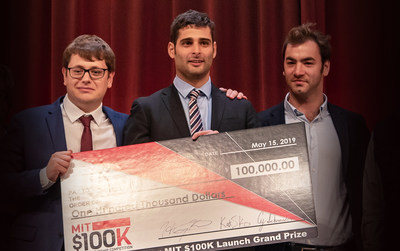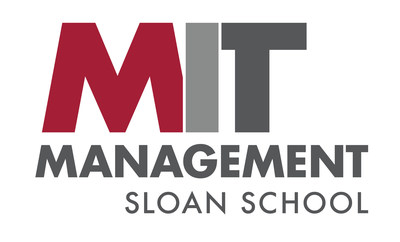CAMBRIDGE, Mass., May 16, 2019 /PRNewswire/ -- Acoustic Wells, a startup born in a laboratory at MIT that has created a new internet of things (IoT) control solution for oil wells that optimizes production while drastically reducing methane emissions, beat out seven finalists to win the Robert P. Goldberg $100,000 grand prize at last night's MIT $100K Entrepreneurship Launch Finale held on the MIT campus.
Now in its 30th year, the MIT $100K Entrepreneurship Competition is an economic barometer for sectors of innovation that are receiving funding by venture capitalists. To date, the MIT $100K has facilitated the birth of more than 160 companies, which have gone on to raise $1.3 billion in venture capital and build $16 billion in market capitalization. More than 30 MIT $100K startups have been acquired by major companies, such as Oracle, Cisco, 3M, and Merck. Over 4,600 people are currently employed by MIT $100K companies. Recent IPOs include Akamai (AKAM) and Hubspot (HUBS).
A major challenge in the operation of oil and gas wells is the ability to monitor the operating conditions and health of pumping equipment without the need for prohibitively expensive equipment or daily inspections. To address this issue, Acoustic Wells has developed a patent-pending, acoustic-based control method that is capable of determining precisely down-hole conditions using a simple and affordable surface sensor. Acoustic Wells' simple plug-and-play hardware processes the data at the edge and seamlessly connects to their cloud platform using long range IoT networks. Artificial intelligence algorithms automatically monitor the pump operation and optimize the production by adjusting the pumping rate while also predicting potential critical failures of the system.
Acoustic Wells' founding team members are:
Dr. Sebastien Mannai, CEO, MIT PhD 2018 in Aerospace Engineering. He is currently engaged in postdoctoral work on AI signal processing in the Gas Turbine Laboratory of the Aerospace Department at MIT.
Dr. Charles-Henri Clerget, COO, who is currently engaged in postdoctoral work in the Earth Resources Laboratory with the Mathematics Department at MIT where he focuses on the big data analysis of drilling operations.
Louis Creteur, CTO and an industrial automation solution specialist who currently serves as IoT and Cloud Architect at Leanbox.
"We bring cutting edge technology in a simple package to help every oil and gas producer optimize their assets while reducing their emissions," says Dr. Mannai.
A panel of judges chose Acoustic Wells based on value creation, value capture, and technological differentiation. Judges included: TJ Parker, Co-Founder & CEO, PillPack; Mira Wilczek, President & CEO, Cogo Labs; Thomas Collet, President, CEO & Director, Phrixus Pharmaceuticals; Tanguy Chau, Venture Investor; and Katie Rae, CEO & Managing Partner, The Engine.
A $10,000 Audience Choice Award was presented to The Read Read, one of the finalist teams. The Read Read has created a patent pending physical device that allows blind and low-vision children to independently learn phonics and braille, and gain early literacy to keep pace with their sighted peers. Users simply touch the braille and large-print letter manipulatives, and get immediate audio feedback. It was developed at the Harvard Innovations Lab, and piloted at the Perkins School for the Blind and the Harvard Graduate School of Education.
Six additional finalists included:
AgroBeads® are biodegradable spheres made from natural ingredients that hydrate plants according to their needs and support their growth and healthy development. Plants not only grow, but they do it faster, and healthier. AgroBeads® does not pollute the environment, improves the chances of germination, and contributes to the development of technologies that impact public health.
Mechanodontics is a new method that can be used instead of braces or aligners that moves teeth independently. Placed behind teeth so they cannot be seen, this method considerably shortens treatment time, allows for easier cleaning than traditional braces, and is more comfortable. This technology, which employs state-of-the-art simulations, allows orthodontists to apply the optimal amount of force to each tooth, easily fixing even complicated mal-alignments that are not correctable with aligners.
Myco Diagnostics is creating low-cost, robust medical diagnostics, using thermostable binding proteins to capture disease biomarkers from patient samples. They are producing point-of-care assays for the detection of urine-based biomarkers of tuberculosis, allowing them to address patient groups ill-served by traditional TB tests.
Posh offers a bot-creation platform using patent-pending technology that makes it easy to tailor a custom chatbot to meet companies' needs. Not only can Posh answer company FAQs, but it can also help a company's customers manage their accounts and convert prospects into sales. Posh does this while interacting with customers via the channels they prefer: across text, voice, social media and the web.
Qtech The team's MIT-educated scientists have invented 3D Nano structured air filters that provide 20x filtration performance, 10x lifetime, and are recyclable at an estimated similar cost of a traditional HEPA filter. Filters catch not only flower pollens, but also bacteria and even viruses, and there is no need for replacements in years.
Stratagen Bio develops oxygen sensors to enable personalized cancer therapies, addressing the unmet clinical need of identifying low-oxygen treatment resistant tumors. They are enabling physicians to identify which cancer patients require a customized treatment to overcome resistance and improve outcomes and survival.
John Harthorne, a founder and former CEO of MassChallenge, served as the keynote speaker. Harthorne's team, Robopsy, won the MIT $100K in 2007. He and Akhil Nigam went on to co-found MassChallenge, a not-for-profit, in 2010. Based on the MIT $100K model, their zero-equity startup accelerator has since gone global and has accelerated 1,975 startups that have raised more than $4.3 billion in funding, generated more than $2.5 billion in revenue, and created more than 121,000 total jobs. Harthorne now serves on MassChallenge's Global Board of Directors.
Since its debut as the MIT $10K Entrepreneurship Competition in 1989, it has grown to include three independent contests – Pitch, Accelerate, and Launch – from September through May. Each contest focuses on developing specific founding skills. For each semi-finalist contender, the MIT $100K brings together a network of resources that includes mentorship from venture capitalists, serial entrepreneurs, corporate executives, and attorneys; media exposure; prototyping funds; business plan feedback; and discounted services. Altogether, almost $1M in non-dilutive prize money and other financial resources are awarded to help these new ventures accelerate. For more on the MIT $100K, please visit: www.mit100k.org
 View original content to download multimedia:http://www.prnewswire.com/news-releases/acoustic-wells-wins-2019-mit-100k-entrepreneurship-competition-300852028.html
View original content to download multimedia:http://www.prnewswire.com/news-releases/acoustic-wells-wins-2019-mit-100k-entrepreneurship-competition-300852028.html
SOURCE MIT Sloan School of Management








